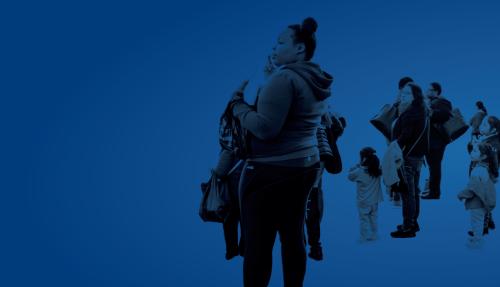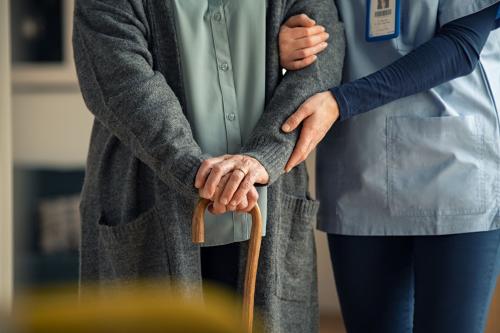This summary is based off two reports and an event from the American Middle Class Hopes and Anxieties Study: What if something happens?: A qualitative study of the American middle class before and during the COVID-19 pandemic, No time to spare: Exploring the middle class time squeeze, and Reframing the narrative of the middle class: Real voices pre- and post-pandemic.
In the fall of 2019, under the auspices of the Future of the Middle Class Initiative, we talked with over 100 middle-class Americans across the country about how they allocate their time, navigate their financial security and health, give and receive respect, and forge meaningful relationships with the important people in their lives. We heard how they worried about not being a good provider or spending enough time with their children, all while feeling immense pressure to be productive.
These focus groups confirmed much of what we already knew – the American middle–class is complicated, multifaceted, dynamic, and the backbone of our economy, even as they chase their own economic security and time to enjoy what matters most to them. As one woman from Las Vegas put it, “The middle class is what makes the world go around.” However, despite the emphasis and rhetoric surrounding the middle class – the American Dream, the future of our country – these individuals are squeezed for time and left chasing financial security that is becoming harder and harder to obtain.
“The middle class is what makes the world go around.”
In 2019, before the COVID-19 pandemic, middle-class parents were struggling to balance work and home life; they worked hard to provide for their children or relatives, sometimes taking more than one job or risking it all to start a business. They worried about their health and were cautious about making smarter decisions. Ultimately, many felt stuck trying to balance everything, without an adequate support system. Our conversations strung together themes of stress, anxiety, hope, and resilience, but also guilt. While many of the individuals we talked with pointed to feeling overwhelmed before the pandemic, the guilt they felt during the early days of the COVID-19 pandemic emphasized the pressures that they were under in normal times.
Under pressure before the pandemic
As we highlighted in our new report, “No time to spare: Exploring the middle class time squeeze,” in a pre-pandemic world, we heard women in particular sharing stories of their hectic lives – many were the sole caregiver, and sometimes provider, for their families. They worked multiple jobs and were trying to move up at work to build a better life for their children or loved ones. Not being able to accomplish everything on their to-do lists or take some time for themselves during the day just added to the pressure that these individuals felt.
For example, we talked with Donna, a mother of two young children from Wichita, Kansas, who lives with her partner, cares for her children, and “works a couple of different jobs.” She described how the time squeeze that working parents are placed under creates a pressure cooker, especially for mothers who often take on the bulk of the childcare and household duties. Donna described feeling torn between being needed at home with her children and being needed at her job at a children’s home. She reflected, “I was working so many hours and anytime they needed me, I could not say no. It’s so hard to say no sometimes.” When faced with prioritizing one over the other, she says, “I know my children need me, but the kids at the children’s home needed me too and it’s hard to split yourself like that.” Similarly, Leslie, a single mother who works full-time as a kindergarten teacher, also has a few jobs on the side. Leslie explained that in the future, she is hopeful that she will learn to relax and do things for herself. She explained, “I have a hard time relaxing, and do more things that I like to do without feeling guilty.” The individuals we talked with were able to maintain their identity as middle class – but at a cost. They struggled with the pressure and ensuing guilt associated with not living up to their own, or society’s ideals, of a hard worker and good parent.
Pandemic eases daily pressures
At the onset of the COVID-19 pandemic and ensuing lockdowns, we heard, particularly from women, that the day-to-day pressures that bogged them down had been slightly alleviated. Many who were working from home no longer had to think about who would pick up the kids from school or if the rent would increase next month. For some, this elicited a feeling of relief; they no longer needed to balance spending time with their children and accomplishing their day-to-day tasks. However, this sense of relief was coupled with a new deep-seated feeling of guilt.
The challenge moving forward is how to alleviate the time squeeze and get working families on stable financial ground
Many participants in our study shared having this “guilty secret,” in this case stemming from feeling grateful for some of the consequences of a globally devastated pandemic. Cassandra, a social worker and single mother, said, “I’m literally saving like $400 a month right now. My credit is looking a lot better right now. I mean, it’s been amazing, the difference in your finances when you are stuck at home and how much money you save.” Even so, Cassandra said that, “[the pandemic] is horrible,” and “I wouldn’t wish the situation on anybody.” Diana, a mother from Las Vegas who works as a virtual assistant, admitted that the stay-at-home orders have given her more time and money, as she did not have to drop off and pick up her children from school each day. She talked sheepishly about the new prospects that have resulted during COVID-19, saying that her family is “thinking about moving” which they can finally do because “the rent finally went down” in Las Vegas. She guiltily admits that the hard stop that occurred at the start of the pandemic “helped with a lot.”
During our launch event for this project, panel participant and Brookings Rubenstein fellow Molly Kinder drew on her own work with essential workers to point out that the decrease in pressure some people are feeling during this time is not universal. Indeed, several of our own study participants lost their jobs and are struggling to maintain their footing in the middle class or have even fallen out of the middle class. These findings highlight the economic and social precarity for so many Americans: they feel the necessity to fight tooth and nail to maintain the image of a middle-class lifestyle but also feel guilt for being the survivors, for having enough resources to hold onto the illusion of economic security despite hardship.
The challenge moving forward is how to alleviate the time squeeze and get working families on stable financial ground, particularly following an economic shock like COVID-19. As Molly Kinder outlined during the event, the solutions are simple: providing living wages and creating an adequate safety net. Building out these policies would enable more Americans to have the financial resiliency to overcome the economic downturn without losing their class identity – or their savings.







Commentary
Guilty secrets: How the COVID-19 pandemic helped some middle class families
April 15, 2021